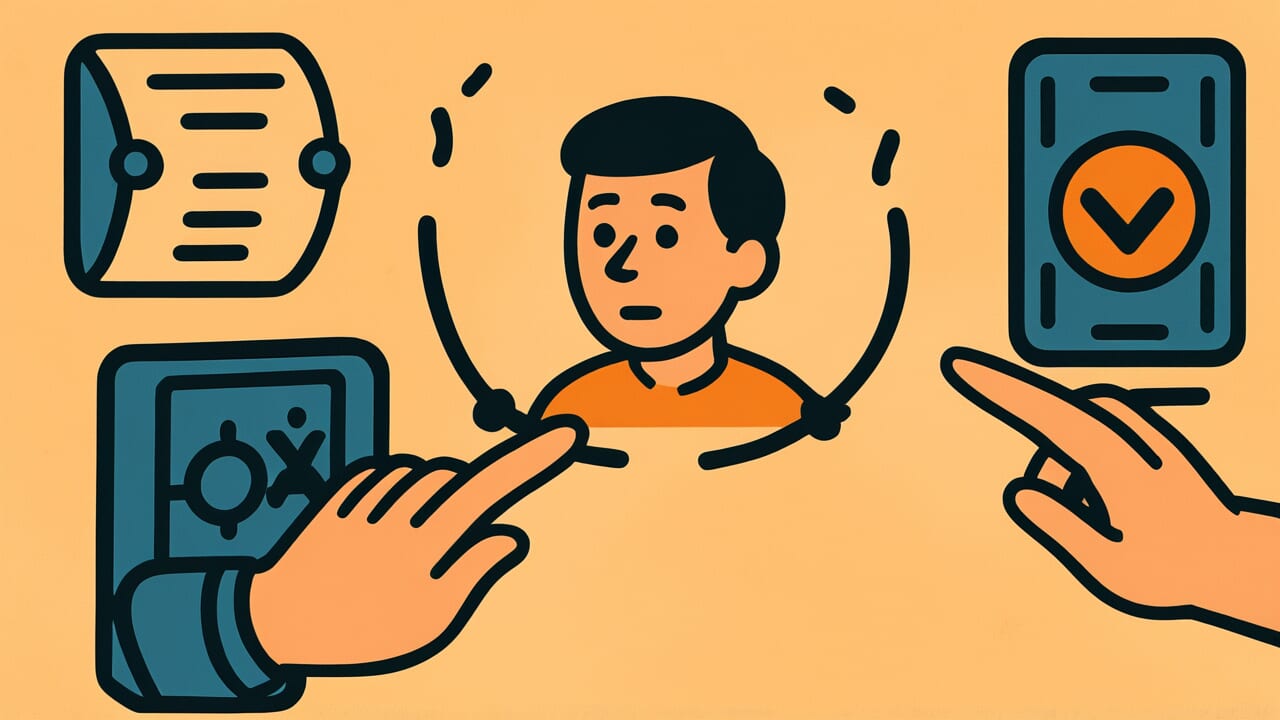How to Read “Hold it and it exists; let it go and it perishes”
Ayatsureba sunawachi sonshi suttsureba sunawachi ushinau
Meaning of “Hold it and it exists; let it go and it perishes”
This proverb means that when you focus your mind and work hard, you succeed. When you become lazy and neglect things, you fail.
When you want to achieve something, you must keep your attention on it. You must work seriously and continuously. Then your goal becomes real.
On the other hand, if you lose focus halfway through or give up, all your previous effort becomes worthless. You lose everything you worked for.
People use this proverb when they want to teach the importance of continuous effort. Talent and luck matter, but the most important thing is the attitude of never giving up.
Today, people understand this as a universal lesson that applies to all fields. It works for studying, sports, work, and everything else.
This saying shows a simple but deep truth. It’s not temporary hard work that brings results. Daily accumulation is what creates success.
Origin and Etymology
This proverb is believed to come from “Mencius,” an ancient Chinese classic. “Mencius” is one of the important texts of Confucianism.
It records the words and actions of Mencius, a philosopher from the Warring States period.
The original text uses the concise expression “操則存、舎則亡.” The Japanese proverb added the particle “則ち” (sunawachi) to make it fit the language.
“操” (ayatsuru) means to concentrate your mind and work on something. “舎” (sutsu) means to let go and become lazy.
“存” (son) and “亡” (bō) don’t just mean existence and disappearance. They show contrasting results: success and failure, achievement and loss.
Mencius was a philosopher who thought deeply about human nature. He taught the importance of nurturing the good heart that people possess.
This proverb extends from that philosophy. If you concentrate your mind on one thing and keep working, you achieve your goal. But if you give up halfway and become lazy, you lose everything.
The power of these words expresses this clear truth in just eight characters. That’s why it continues to resonate with people across time.
The proverb came to Japan after the Edo period along with Confucian learning. It spread as a moral teaching.
Usage Examples
- I practiced steadily every day, so just as “Hold it and it exists; let it go and it perishes” says, I finally achieved my goal
- Even the English study I started, as “Hold it and it exists; let it go and it perishes” warns, will go back to zero if I slack off, so I need to be careful
Universal Wisdom
Human beings have a mysterious duality. We have the power to dream big and start something with burning passion.
At the same time, we also have the weakness to lose that heat and give up halfway. This proverb has been passed down for so long because it sees through this essential human nature.
We all know from experience. Even when we’re full of motivation at the start, our feelings fade as time passes.
The first step is easy, but continuing is incredibly difficult. This proverb doesn’t blame us for this human weakness. Instead, it gently warns us.
What’s interesting is that this proverb focuses on “how you hold your mind,” not on “talent” or “luck.” It teaches that what separates success from failure isn’t inborn ability.
It’s the willpower to continue. This is also a hopeful message. Anyone can obtain the results they want, depending on how they use their mind.
Ancient people chased dreams just like we do today. They fought the same temptation to give up. Even as times change, the workings of the human heart don’t change.
That’s why these words still touch our hearts today.
When AI Hears This
Brain neurons become thicker and stronger in the circuits that get used. Circuits that don’t get used literally disappear. This is called neuroplasticity.
This proverb perfectly describes this phenomenon.
For example, research examining London taxi drivers’ brains found something remarkable. People who continued training to memorize complex roads had physically larger hippocampi.
The hippocampus is the part that controls spatial recognition. Conversely, when stroke patients stop using a paralyzed hand, the brain area controlling that hand shrinks. Other functions take it over.
In other words, when you stop “holding” something, that ability truly “perishes” from your brain.
What’s even more interesting is how fast this change happens. Just a few weeks without piano practice weakens the neural circuits that move your fingers.
On the other hand, if you practice even a little every day, the synapses strengthen. Synapses are the connection points between neurons. Your skills are maintained.
Ancient philosophers couldn’t have known about brain structure. Yet they accurately understood from experience that human abilities are preserved only through “use.”
Modern neuroscience has proven that this insight wasn’t a metaphor. It was biological fact.
Lessons for Today
Modern society overflows with things that steal our attention. Smartphones, social media, streaming services.
Staying focused on one thing is harder than ever before. That’s exactly why this proverb’s teaching has special meaning now.
If you’re about to start something, or if you’re working on something right now, carve this proverb into your heart.
What matters isn’t doing everything perfectly every day. Even if it’s a small step, keep moving forward. Ten minutes or even five minutes—that accumulation will guide you to your goal.
When you feel like giving up, remember this. If you slack off today, it becomes easier to slack off tomorrow.
But if you continue today, you become someone who can continue tomorrow. It’s also training that strengthens your willpower.
This proverb isn’t demanding harshness from you. Rather, it believes in the power within you.
If you keep directing your mind toward something, the path will surely open. This hope is what these words quietly but powerfully convey.



Comments